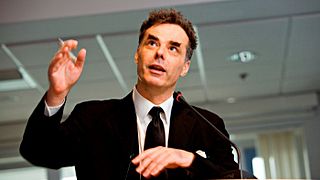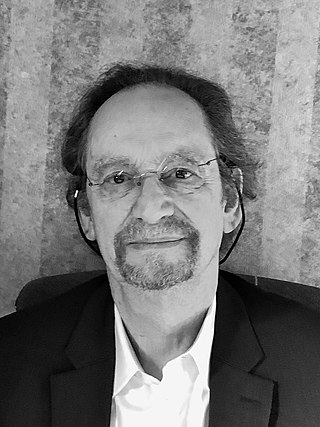
The International Criminal Court is an intergovernmental organization and international tribunal seated in The Hague, Netherlands. It is the first and only permanent international court with jurisdiction to prosecute individuals for the international crimes of genocide, crimes against humanity, war crimes and the crime of aggression. The ICC is distinct from the International Court of Justice, an organ of the United Nations that hears disputes between states.

International relations (IR) are the interactions among sovereign states. The scientific study of those interactions is also referred to as international studies, international politics, or international affairs. In a broader sense, the study of IR, in addition to multilateral relations, concerns all activities among states—such as war, diplomacy, trade, and foreign policy—as well as relations with and among other international actors, such as intergovernmental organizations (IGOs), international nongovernmental organizations (INGOs), international legal bodies, and multinational corporations (MNCs). There are several schools of thought within IR, of which the most prominent are realism, liberalism, constructivism, and rationalism.
Stephen Eric Bronner is a political scientist and philosopher, Board of Governors Professor of Political Science at Rutgers University in New Brunswick, New Jersey, United States, and is the Director of Global Relations for the Center for the Study of Genocide and Human Rights. Bronner has published over 25 books and 200 journal articles.

International criminal law (ICL) is a body of public international law designed to prohibit certain categories of conduct commonly viewed as serious atrocities and to make perpetrators of such conduct criminally accountable for their perpetration. The core crimes under international law are genocide, war crimes, crimes against humanity, and the crime of aggression.
Critical international relations theory is a diverse set of schools of thought in international relations (IR) that have criticized the theoretical, meta-theoretical and/or political status quo, both in IR theory and in international politics more broadly – from positivist as well as postpositivist positions. Positivist critiques include Marxist and neo-Marxist approaches and certain ("conventional") strands of social constructivism. Postpositivist critiques include poststructuralist, postcolonial, "critical" constructivist, critical theory, neo-Gramscian, most feminist, and some English School approaches, as well as non-Weberian historical sociology, "international political sociology", "critical geopolitics", and the so-called "new materialism". All of these latter approaches differ from both realism and liberalism in their epistemological and ontological premises.

Lyal S. Sunga is a well-known specialist on international human rights law, international humanitarian law and international criminal law.
David Jonathan Andrew Held was a British political scientist who specialised in political theory and international relations. He held a joint appointment as Professor of Politics and International Relations, and was Master of University College, at Durham University until his death. He was also a visiting Professor of Political Science at Libera Università Internazionale degli Studi Sociali Guido Carli. Previously he was the Graham Wallas chair of Political Science and the co-director of the Centre for the Study of Global Governance at the London School of Economics.

The United States is not a state party to the Rome Statute of the International Criminal Court, which founded the International Criminal Court (ICC) in 2002.
Transitional justice is a process which responds to human rights violations through judicial redress, political reforms in a region or country, and other measures in order to prevent the recurrence of human rights abuse. Transitional justice consists of judicial and non-judicial measures implemented in order to redress legacies of human rights abuses. Such mechanisms "include criminal prosecutions, truth commissions, reparations programs, and various kinds of institutional reforms" as well as memorials, apologies, and various art forms. Transitional justice is instituted at a point of political transition classically from war to positive peace, or more broadly from violence and repression to societal stability and it is informed by a society's desire to rebuild social trust, reestablish what is right from what is wrong, repair a fractured justice system, and build a democratic system of governance. The core value of transitional justice is the very notion of justice—which does not necessarily mean criminal justice. This notion and the political transformation, such as regime change or transition from conflict are thus linked to a more peaceful, certain, and democratic future.

United Nations Security Council Resolution 1593, adopted on 31 March 2005, after receiving a report by the International Commission of Inquiry on Darfur, the Council referred the situation in the Darfur region of Sudan to the International Criminal Court (ICC) and required Sudan to co-operate fully. It marked the first time the council had referred a situation to the court, and also compelled a country to co-operate with it.

Daniele Archibugi is an Italian economic and political theorist. He works on the economics and policy of innovation and technological change, on the political theory of international relations and on political and technological globalisation.
Chris Mahony is a former rugby union player for the Auckland Air New Zealand Cup team, playing fullback centre or wing. He played for Oxford University where he has completed a Masters in African Studies and a DPhil in Politics.
Benedict William Kingsbury is Vice Dean and Director of the Institute for International Law and Justice at New York University and a leading scholar in international law and diplomacy. He was recently also announced as a faculty director for the new NYU Law Guarini Institute for Global Legal Studies. Born in Holland and raised in Hamilton, New Zealand he was a Rhodes Scholar in 1982, a commercial law graduate from Canterbury University in Christchurch, New Zealand and a doctor of International Relations and Law at Balliol College, University of Oxford. He lectured at Oxford University and Duke University prior to his New York University Law School appointment. He is an honorary citizen of San Ginesio in Italy, the birthplace of Alberico Gentili (1552-1608). He received an honorary doctorate in law from Tilburg University in 2016. From 2013 to 2018 he was joint Editor in Chief of the American Journal of International Law. He received NYU Law School's Podell Distinguished Teaching Award in 2019.

William Anthony Schabas, OC is a Canadian academic specialising in international criminal and human rights law. He is professor of international law at Middlesex University in the United Kingdom, professor of international human law and human rights at Leiden University in the Netherlands, and an internationally respected expert on human rights law, genocide and the death penalty.

Roderick Arthur William Rhodes, usually cited as R. A. W. Rhodes, is a British professor of political science.
Chandra Lekha Sriram (1971–2018) was Professor of Law at the University of London, School of Oriental and African Studies (SOAS). She has written and lectured widely on conflict prevention, post-conflict peacebuilding, human rights, international criminal law, and transitional justice. Her most recent monograph, Peace as governance: Power-sharing, armed groups, and contemporary peace negotiations (2008), offered a comparative critical examination of the use of power-sharing incentives in peace processes in Colombia, Sri Lanka, and Sudan. Previous monographs on transitional justice and international criminal accountability, Confronting past human rights violations: Justice versus peace in times of transition (2004) and Globalizing Justice for mass atrocities: A revolution in accountability (2005); examined transitional justice and internationalized and externalized criminal justice processes in or for Sierra Leone, Timor-Leste, El Salvador, Honduras, Sri Lanka, South Africa, and Argentina.

Raffaele Marchetti is an Italian political scientist and editorialist.
Throughout the ongoing Darfur genocide in the Darfur war there has been a systematic campaign of rape, which has been used as a weapon of war, in the ethnic cleansing of black Africans from the region. The majority of rapes have been carried out by the Sudanese government forces and the Janjaweed paramilitary groups. The actions of the Janjaweed have been described as genocidal rape, with not just women, but children also being raped, as well as babies being bludgeoned to death and the sexual mutilation of victims being commonplace.
Richard K. Ashley is a postmodernist scholar of International relations. He is an associate professor at the Arizona State University's School of Politics and Global Studies.

The Darfur genocide is the systematic killing of ethnic Darfuri people which has occurred during the War in Darfur and the ongoing War in Sudan (2023–present) in Darfur. It has become known as the first genocide of the 21st century. The genocide, which is being carried out against the Fur, Masalit and Zaghawa ethnic groups, has led the International Criminal Court (ICC) to indict several people for crimes against humanity, rape, forced transfer and torture. An estimated 200,000 people were killed between 2003 and 2005.











